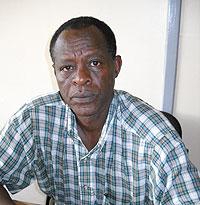It is extremely difficult to measure levels of reconsolidation in post-violence situations and as Senator Bernard Makuza once said when he was Prime Minister, it is not possible to determine levels of reconciliation in aggregate terms but through observing social trends in the community.


It is extremely difficult to measure levels of reconsolidation in post-violence situations and as Senator Bernard Makuza once said when he was Prime Minister, it is not possible to determine levels of reconciliation in aggregate terms but through observing social trends in the community.Testimony from a man in Ngoma district is an indication of such trends that point at reconciliation and peaceful co-existence. The gentleman who served a 12-year sentence for crimes of genocide appeared on Rwanda Television and apologized to the nation on January 29. What was touching was the fact that the gentleman traveled from his district to the town hall meeting organized by Rwanda Unity and Reconciliation Commission with a woman whose relatives he had killed in the 1994 Genocide against the Tutsi. The man had apparently approached the woman and asked her for forgiveness.The testimony demonstrates factors that are vital in the process of reconciliation: acceptance of responsibility by perpetrators, asking for forgiveness, official programmes that reassure the population of justice and equity as well as promotion of constructive ideology. Some of these factors were reflected in the man’s conduct. He confessed his crime and pleaded guilty to the courts, asked for leniency and on his release from prison sought his victims and asked for forgiveness. The lady he traveled with to Kigali said she forgave him, introduced him to a cooperative society. Membership to the cooperative society facilitated his rehabilitation into the community, and through dialogue and socialization he leant about development programmes underway after a decade in prison.In the aftermath of violent conflict both victims and perpetrators need reassurance of security and of the need to co-exist. The man’s testimony underscores the importance of government role in the process of building peace and trust. He was for example reassured when he found out that the government had built a house for his wife while he was in prison and impressed by high standards of governance compared to past leaders who encouraged them to kill. He said "it as madness for one to get a machete and chop a fellow human being of whom has no problem or quarrel with”.This is a story of all Rwandans. After the madness that engulfed our nation in 1994, concerted efforts towards unity and reconciliation by the citizens and their government have achieved very high levels reconciliation and peaceful co-existence but more significantly a strong sense of nationalism that is necessary for sustainable peace and prosperity. The research findings on "Rwanda Reconciliation Barometer” made public recently by the National Unity and Reconciliation Commission (NURC) affirm the above claim. The research sought to find out how citizens perceive reconciliation, how they conduct themselves and their efforts in the journey of reconciliation. Rwandans, according to the research are proud to be Rwandans and wish their children to perceive themselves as Rwandans instead of regarding themselves as Bahutu, Batutsi or Batwa, while 94% confirmed that common values shared by all Rwandans have accelerated reconciliation and 96% confirm that every day conduct and actions of Rwandans is conducive to reconciliation. These findings indicate how and individual views their own nationality and the rights of fellow citizens helps in the reconciliation process This sense of nationalism is further illuminated by the report’s findings about the interviewees’ response to the role of history in past conflict. The researchers found that citizens understand the role of the distortion of their history in the evolution of conflict that culminated in the 1994 Tutsi genocide and appreciate the need to address the issue so that the right version history can be used in reconciliation. 98% of those interviewed confirmed that the way History was taught in the past led to divisionism and appreciate the current approach to teaching Rwanda history as appropriate to reconciliation. The citizens awareness of the fact that the distortion of history and misuse of ethnicity led to conflict, shows reconciliation is possible that today. The research devised parameters for assessing levels of reconciliation which should act as guide posts to all Rwandans, especially those actively involved in Unity and Reconciliation programmes, so that more efforts and innovation are put where they are needed. The variables (parameters) of social cohesion, political culture, human security, transitional justice, citizenship and identity, used in the research to assess levels of reconciliation provide a holistic framework on which we can set targets to raise the overall performance from the overall 80% to 100% in the long run. The Rwanda Unity and Reconciliation Commission is doing a good job, but I urge them to summarize the report and circulate it even to the doubting Thomases. The commission chairman Bishop John Rucyahana, during the launching of the research report, observed there are some countries that are not happy with the way Rwandans are reconciling and developing, especially those that supported the Genocide in one way or another. However for us, we shall continue to focus on what we do and I am optimistic that our country is on the right track”. Many Rwandans concur with the bishop. If you pay attention to our musicians, dramatists and other artists, you will find a pattern of national cohesion, respect for human dignity, patriotism and love for the country. If you want more evidence to corroborate the scientific research, visit any Mudugudu, and see for yourself how people live harmoniously, intermarry, share food and drink and together work on development projects. Listen to local leaders and judge for yourself how the citizen is involved in governance issues including his/ her physical and social security. All theses underpin the reconciliation process.


